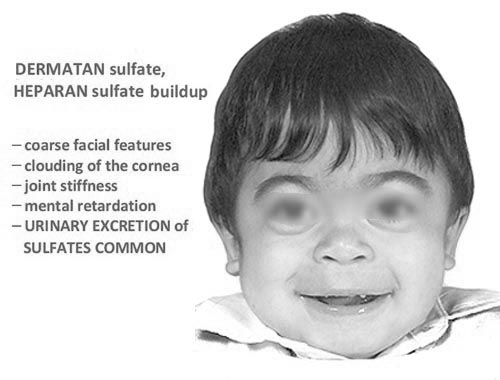Mucopolysaccharidosis, Hunter syndrome (lysosomal storage disease)
Mucopolysaccharides consist of glycosaminoglycans attached to a link protein with a hyaluronic acid core. Lysosomal enzymes degrade these macromolecules into smaller components. Heparan sulfate, dermatan sulfate, and keratan sulfate are by-products of an incomplete degradation process. The accumulation of these compounds interferes with cell function. Different forms of the disease were described separately throughout the 20th century. Their clinical presentations are varied depending on the type of enzyme defect and glycoprotein accumulated. Because the body doesn't have adequate supplies of the enzyme to break down certain complex molecules, the molecules build up in harmful amounts in certain cells and tissues. The buildup that occurs in MPS eventually causes permanent, progressive damage affecting appearance, mental development, organ function and physical abilities. MPS appears in children as young as age 2. It nearly always occurs in males. There's no cure for the disorder. Treatment involves management of symptoms and complications. Incidence: >1-100,000 people; MPS I (alpha-L-iduronidase deficiency) severe form (Hurler), milder forms (Hurler-Scheie, Scheie); MPS II-Hunter syndrome (iduronate-2-sulfatase deficiency). Incidence: <1-100,000 people; MPS III-Sanfilippo syndrome (4 subtypes: A, B, C, D) (deficiency of heparin-N-sulfatase and other enzymes); MPS IV-Morquio syndrome (2 subtypes: A, B) (N-acetylgalactosamine 6-sulfatase and beta galactosidase deficiency); MPS VI-Maroteaux-Lamy syndrome (N-acetylgalactosamine 4-sulfatase deficiency); MPS VII-Sly syndrome (beta glucuronidase deficiency); MPS IX-Natowicz syndrome (hyaluronidase deficiency).
